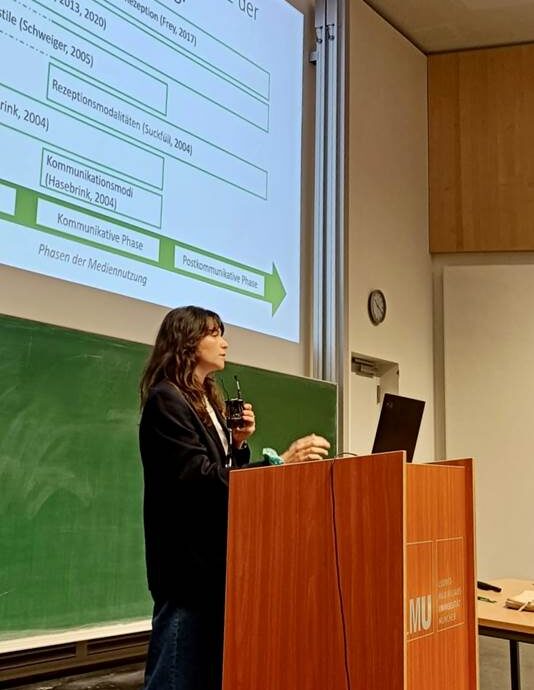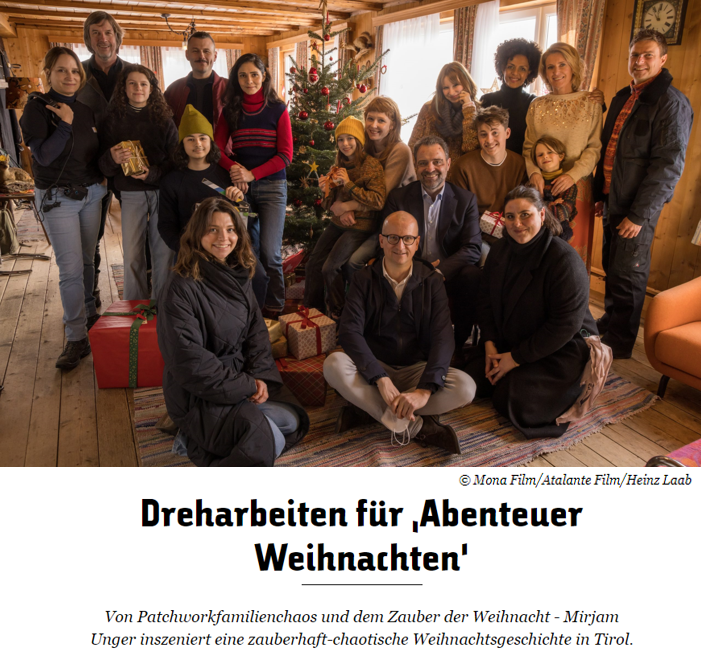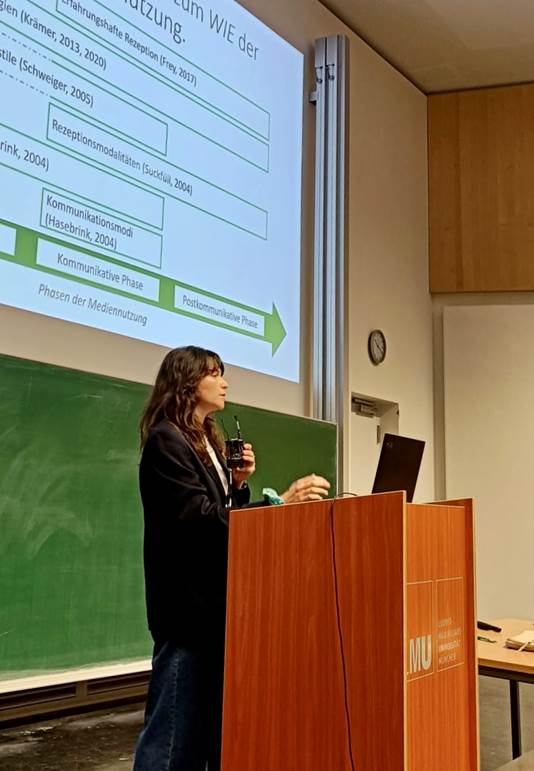
Try It Out
MediaOn Tuesday, my uncle asked me a question: what is your plan for the master’s degree and future job?
aaaaaa
I froze for a moment. For a long time, I always categorized myself as someone who had a clear goal for both study and working career. However, perplexity seized me from time to time. There are so many choices regarding the field of communication. How can I find my way out? How to balance between the burden of the reality and the joy of ideal?
aaaaaa
Luckily, on Wednesday, the words of Laura Aleman, a PhD. candidate and teacher in LMU, smoothed my nerves. With her extremely rich and colourful experience, she taught me a phrase that could kill any heart evil: just try it out.
aaaaaa
*
aaaaaa
Q: I noticed that you chose media communication as your bachelor’s degree, and then the media management as your master’s degree. Do you have any goal or professional aim after graduation when attending college so that you choose this major?
aaaaaa
A: When you study communication science at LMU, it means that you have to do two internships. One of the internships I did, was in the show in comedy team at a TV station. And when I finished the internship, they were like “we have this traineeship that you could do, what do you think do you want to apply?” I really enjoyed working there, so I thought, let’s give it a try.
aaaaaa
After my bachelors, I also applied for a masters in media management. At that time, I thought, I want to work in the media field, but I need to know more about the financial side as well and get to know the economics of the media industry. But I also applied for the traineeship, and when I got it, I just had to do it and cancelled the masters. I learned so much and after 1.5 years I got a job as a junior program manager (producer). I was very close to my boss and I was very interested in how the structures work and how do we commission the shows. Therefore, I started to get into helping him doing all the presentation with the management. It was me and my colleague who did mostly all of the comedy shows, so I got a lot of responsibilities.
aaaaaa
Then at some point (after 4 years), I was like I really want to do my masters and I really want to go abroad which I didn’t do during my bachelor. Also, I felt like I was still at an age to do that and not be too old to study again. It wasn’t that of a hard choice because I did a lot on the creative side and on the production side, I learned a lot on the job, but if I want to go further and if I want to go to a higher management level I need to get more competence through a master with a more economic base in the media industry. And I would recommend to anyone to go abroad and live somewhere else because it’s just so much fun and it’s just so cool to be able to do that.
aaaaaa
Q: So at first, like the two internships, is it because you are interested in both fields, so you want to try both out?
aaaaaa
A: I was really young, for the first one it was actually not that easy to get one, so I just went for something that I thought was kind of cool (which was an e-commerce jewelry company). For the second one, I had another internship offer in marketing but I decided to go for TV. It’s just like small decisions which led to a path.
aaaaaa
Q: Your working experience is very rich and colourful. What causes the changes of these job choices?
aaaaaa
A: When I came back from the UK, I thought I really like the idea of doing more strategic work in the media industry. I thought maybe being a consultant is a good idea, so I started in one of the biggest media consultancies and at the beginning the work itself was really cool and I liked it, but the environment wasn’t what I thought how I like to work. It’s very long hours, four days in a different city, flying back and forth, which is just bullshit for the environment as well. If you’re the first one to leave, you’ll be looked down in a way which just didn’t feel right. For me, this wasn’t the environment that I wanted to work in. Then I got in touch with my old boss who luckily was like “we wanted to get back to you anyway so how about you coming back and you do more strategic part as well”. I said to myself “well, let’s try”. That’s when I went back as a senior producer.
aaaaaa
Q: Then what made you leave to be a film producer?
aaaaaa
A: I got a little bit tired of not being on the production side and not being able to be as close to the content as possible. Also, which didn’t work out really well was the fact that they promised me to do more strategic work. So, if you’re not changing anything about my tasks, and that’s what you promised me, then I have to leave. I had to find something else, so what could I do? I thought content and fiction is something which I would love to experience and I read an article about a German actress and her producer who were talking about their company and that they are investing in content which was specifically feminist and with more diverse female protagonists. While I read the article, on the right side, I saw an advertisement that they were looking for assistant / junior producers. And I just applied and it worked out. Then I was like “ok, that’s cool and great, let’s go there and see what happens.”
aaaaaa

aaaaaa
Q: Why after all these you chose to come to LMU?
aaaaaa
A: When I came back from London, I applied for a job as a doctoral candidate but I didn’t get it. When I was in London, I realized I really like studying, and if I could do studying as a job and get money for it, that would be my absolute dream. When I was working at the film production company, I just saw again an ad and I was like “this is interesting.” Then I just applied. Maybe for some people, it’s like “this is it. I’m going to do this forever.” But with this kind of background, there are so many paths to go. Also, I was, and still am quite confident that I will find a job anywhere so I’m not really scared to try new things (which is a big privilege!) I thought “okay, so I did the film production thing and it was nice.” But I am not completely happy and fulfilled.
aaaaaa
Therefore, when I saw this opportunity at the LMU, I thought that’s an opportunity which is not going to be there again in two years, so why not try and do it and see. If I don’t like it, I’ll find something else. I would encourage anyone to do that to get as much input and just try around some stuff and be brave about this because you can only get closer to what you want to do. And also you change, so probably you wouldn’t want to do the same thing your whole life. If you change, why shouldn’t your goals and interests change? I think it’s absolutely fine to do and try out different stuff.
aaaaaa
Q: I really admire it because for me my thoughts also change from time to time. Therefore, I’m a bit of scared to make decisions and feel confused sometimes with where to go next since it’s very hard to find a job now. How do you have the courage to try so many different fields?
aaaaaa
A: I think first, I’d never quit a job before I didn’t have another one. I would just say when you start to feel like something isn’t right, there’re two things you can do: either trying to change the environment which means talking to your boss about how the environment is not productive or whatever, like you could try to get different tasks, all these kinds of things to try to get your interest and love for the job back. Or you can get out of the situation. For me, I always try to do the first thing first, and when I realize that’s not working in a way that I want it to work then I have to go because that’s the last thing I could do to make me feel better. I would always advise anyone to try to change the environment and be vocal about what’s not working for you, what’s working for you. That doesn’t necessarily mean that you will be successful, but that means that when you go, you did communicate everything and you did everything you could to be the best employee that you want to be – nobody wants to do an awful job. If you’ve tried, but it didn’t work, then that’s it, just move on.
aaaaaa
The other thing is that I never took a job because I solely wanted to say “no” to the previous one. I always took the job because it really sounded interesting to me. I think it’s very important to do things for the right reason. For example, I told you before the environment at the media consultancy was bad for me because it was long hours and a lot of traveling. But if the long hours would have been filled with work which would have been fulfilling for me, I probably wouldn’t have cared that much. When I worked as a producer I sometimes worked till three o’clock in the morning So, the thing is that it’s not about how long you work or how stressful the work would be, it’s about “do you really care about what you’re doing?” I think that’s how you just go forward and try to make the decisions. And something that I’ve been telling a lot of my friends is that there’s no such thing as a decision in the working environment that is absolutely forever. So just try it, and if it’s not working, do something else.
aaaaaa

aaaaaa
Q: Is it better to try new things first then come back to university, or the other way around since the campus sometimes can build a safer place for youngsters to develop?
aaaaaa
A: First of all, when you start working in your twenties and you’re insecure anyway, then that’s just how it is and you have to go through it no matter where you are. But when you grow a little bit more, I think it makes sense that you get to know yourself more, and then you realize “so this is not really working for me, let’s go somewhere else, or let’s try to change things, like the relationship, or the feedback culture whatever.” I think you just have to be very vocal and communicate what you need. Still, realize that you are not going to change everyone and don’t be disappointed about that because that’s just how it is. I think it’s always good to go out of your comfort zone.